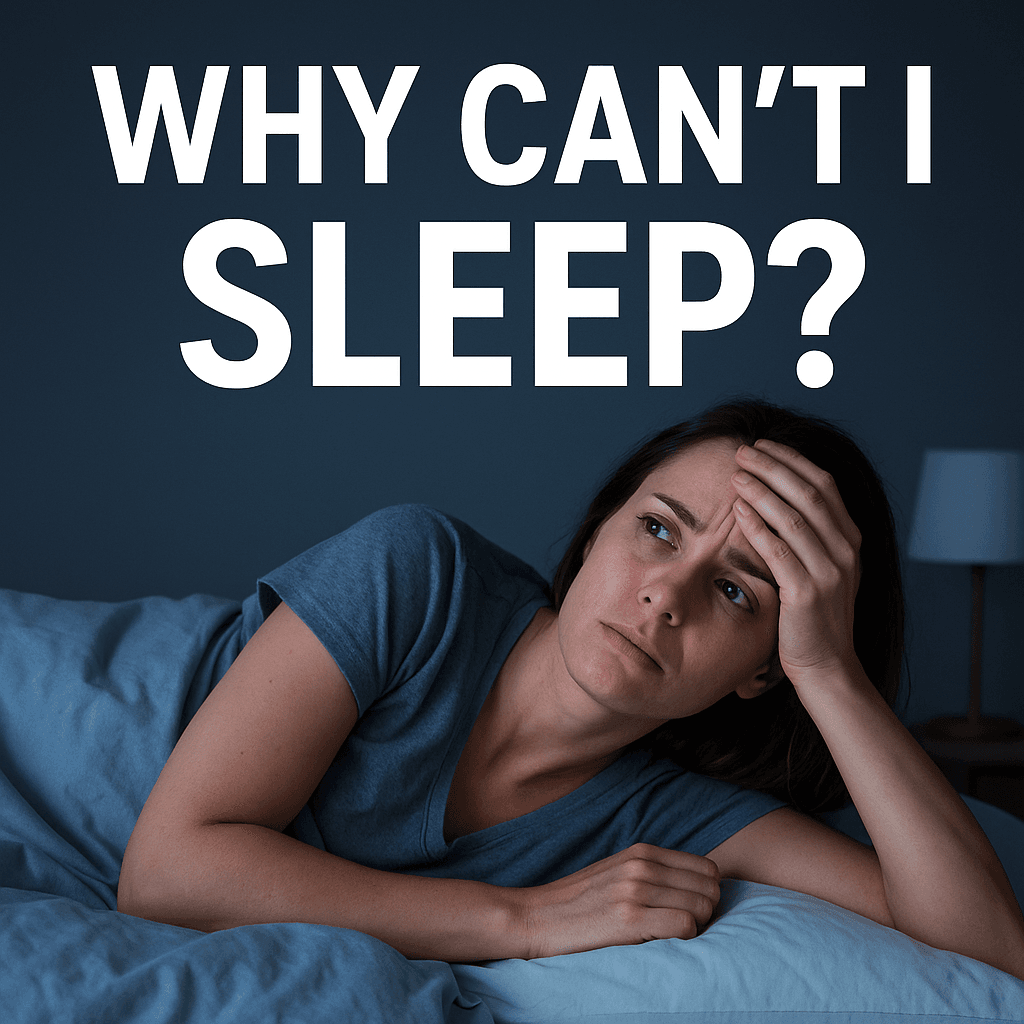Why Can’t I Sleep? Understanding the Causes and Finding Solutions.
Introduction.
Many people toss and turn at night staring blankly at the ceiling wondering to themselves, ‘Why can’t I sleep?’For some, this happens once in a while, while for others, it is a regular affair. Sleeping is not “taking a rest”. Sleeping is when the body heals and recharges. A good sleep also helps keep the mind sharp.
Poor sleep affects mood, focus, and even long-term health.
A lot of people are in the same boat as you if you’ve had trouble sleeping. Let’s take a look at some common causes of sleep problems and what you can do to finally get the sleep you need.
Common Reasons You Can’t Sleep
- Stress and Anxiety.
Your mind doesn’t have an ‘off’ switch. When you’re worried about work, money, love, health and other issues, your brain keeps going even though your body is tired. Most commonly disrupting sleep is this mental restlessness.
Signs stress may be keeping you awake.
Racing thoughts at night.
Waking up in the night and being unable to fall asleep again.
Feeling tense, restless, or having a fast heartbeat in bed.
What can help.
Deep breathing or meditation before bed.
Writing down worries in a journal to “clear your mind”.
Make a calming bedtime routine (soothing music, reading, or gentle stretching).
- Poor Sleep Habits.
The choices you make daily may directly influence your sleep. Sleep experts refer to this as “sleep hygiene,” which is a helpful term.
Habits that hurt your sleep.
Using your phone and/or computer until late at night can delay melatonin release (due to blue light).
Drinking coffee or energy drinks too late in the day.
Going to bed late on Friday or Saturday but waking up early for work on weekdays.
Napping too much during the day.
Better sleep hygiene tips.
Keep a consistent sleep and wake time—even on weekends.
Avoid screens 1–2 hours before bed.
Limit caffeine after mid-afternoon.
Create a dark, cool, and quiet bedroom environment.
- Medical Conditions.
Inability to sleep is not lifestyle-related a lot. Certain medical conditions interfere with normal rest.
Examples include.
Insomnia disorder is when a person has trouble falling asleep or staying asleep for at least 3 nights per week over 3 months or more.
Sleep apnea is a condition in which breathing stops and starts. It can cause loud snoring, not feeling refreshed after sleep, and sleepiness throughout the day.
Restless legs syndrome (RLS) is an uncomfortable feeling in the legs that makes you move.
People who suffer from arthritis or back pain cannot stay still.
Mental health disorders often cause disrupted sleep, such as depression.
Speak to your doctor if you suspect something is wrong with your health. You need to get checked.
- Hormonal Changes.
Hormones play a big role in sleep. It can be difficult to sleep due to ups and downs in melatonin.
Situations where hormones affect sleep.
Menopause: Hot flashes and night sweats often rob women sleep.
Restless due to discomfort of pregnancy, frequent urination and hormonal changes.
As we age, we may produce less melatonin, resulting in lighter, shorter sleep.
What can help.
Keeping the bedroom cool and ventilated.
Practicing relaxation techniques.
Seeking medical advice if symptoms are severe.
- Diet and Lifestyle Choices.
What you eat and drink can either help or hurt your sleep.
Sleep-disrupting foods and habits.
- Heavy meals late at night → cause indigestion.
- Alcohol may ease you to sleep but will stop you from getting deep sleep.
- Eating sugary snacks before bed causes your blood sugar to spike before it crashes.
- When you do not exercise much, your body can experience false tiredness from lack of movement.
Better choices for restful sleep.
- Eat lighter dinners, at least 2–3 hours before bed.
- Drink herbal teas like chamomile or peppermint.
- Exercising is good, but not before bed.
- Don’t drink too much before bed so you won’t have to go to the bathroom all night.
- Environmental Factors.
Your bedroom environment has more power than you think. Loud sounds, bright lights and uncomfortable mattresses prevent sound sleep.
What may be affecting you.
- Too much light (streetlights, phone screens, TV glow).
- Noisy surroundings (traffic, pets, neighbors).
- Uncomfortable mattress or pillow.
- Room too hot or too cold.
Simple solutions.
- Use blackout curtains or a sleep mask.
- Try white noise machines or earplugs.
- Invest in a supportive mattress and pillow.
- Keep the temperature of your room between 60 °F (15 °C) and 67 °F (19 °C) for sleep.
Healthy Habits for Better Sleep.
If you’re wondering “Why can’t I sleep?The good news is, there are things you can do.
Daily Sleep-Boosting Routine:
- When you wake up in the morning, expose your body to natural sunlight.
- Afternoon: Keep active but do not drink caffeine late.
- At evening, eat light, reduce screen time and indulge in calming activities.
- It is best to sleep and wake up at the same time every day.
Relaxation Techniques Worth Trying:
- This method involves tensing and relaxing certain muscle groups in order to relieve bodily tension.
- Mindful meditation is the process of focusing on your breathing.
- A warm bath or shower helps to lower your body temperature afterward, signaling to your body it is time for sleep.
When to Seek Professional Help
- Occasional sleepless nights are normal. But if you.
- For several months, experience difficulty sleeping at least three nights per week.
- Feel exhausted, irritable, or unfocused during the day.
- To snore loudly, gasp for air, or stop breathing while sleeping.
- Experience restless, painful, or twitching legs.
- you should talk to a healthcare pro You might have a sleep disorder that needs medical treatment.
Conclusion
You may not be able to sleep but don’t despair, it is not the end. There are various things that causes sleep problems such as stress, illness and bad habits. The important thing is to discover what is impacting your sleep and to make gradual changes to improve it.
Good sleep is not a luxury; it is essential for your physical and mental well-being. Seek professional help if establishing healthy sleep habits did not work for you. You have an excellent sleep and wake up full of energy each day.












